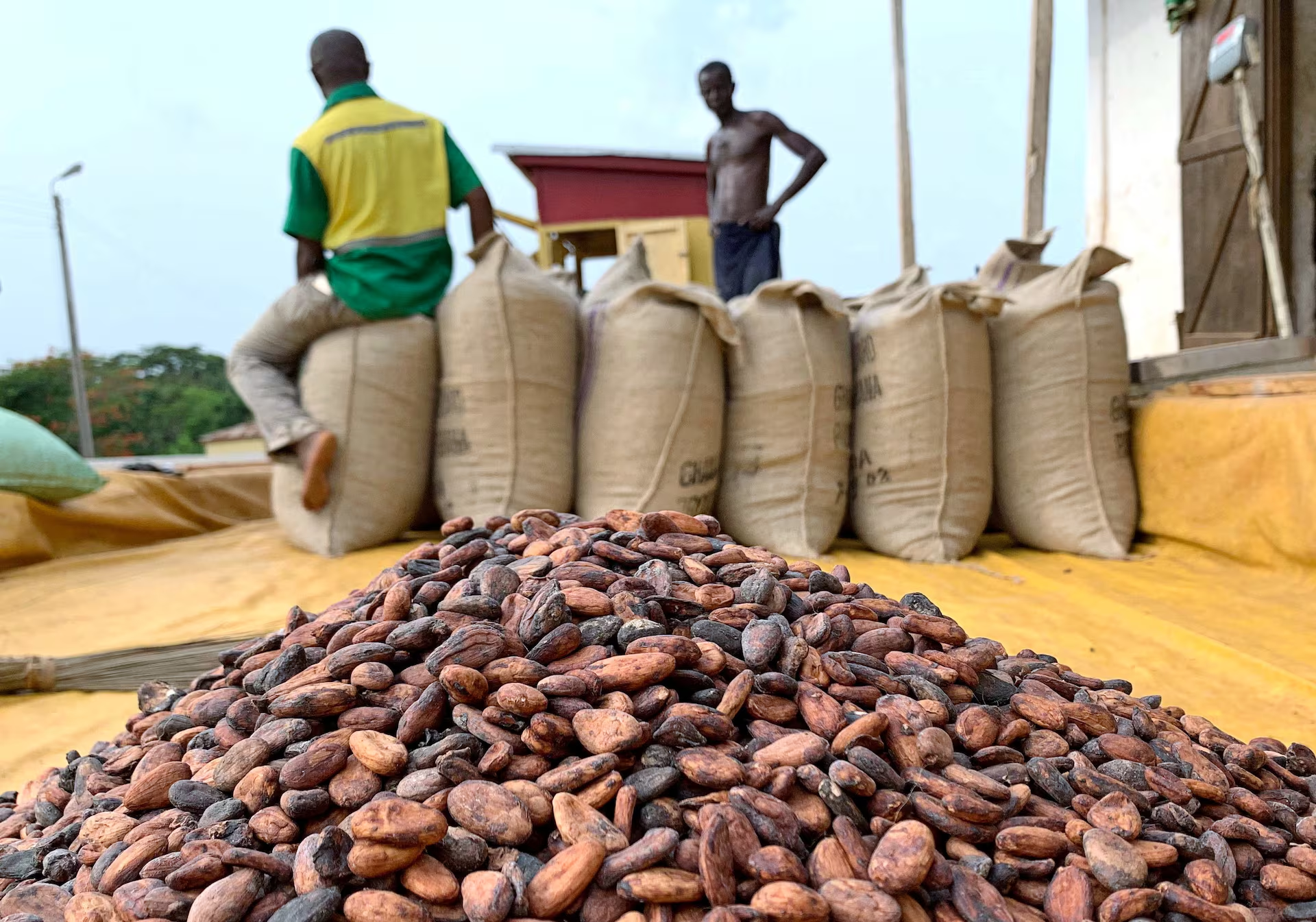
new Onion market at Adjen Kotoku is booming now

The rather calm town of Adjen Kotoku, near Amasaman in the Ga West municipality, has come alive with the relocation of the onion traders in the area.
The fairly quiet community is now vibrant, with many people trooping in and out of the area every now and then for business.
Barely a week ago, onion sellers, truck drivers and unloaders vacated the Agbogbloshie Market in Accra to their current location to continue their business.
The Mirror team saw brisk business activities when it visited on Tuesday as onion sellers served their customers who had come from far and near.
Customers who went to the Agbogbloshie Market were directed to Adjen Kotoku.
Even though the main road from the junction to the township was not too busy, tricycles were constantly seen carting sacks of onions from the market.
There were taxis and trotros at the junction to convey customers and traders to the market while those with their private vehicles drove straight to the place.
Some traders told The Mirror that accommodation challenges are biting hard on the onion traders as securing places to lay their heads at night was becoming difficult.
When business closed at night, many of the traders had to sleep by their goods under the sheds provided by the Greater Accra Regional Minister and the Ga West Municipal Assembly.

During the day, they bath and use the movable toilets which had been provided in the market.
Many of the traders did not also have sheds as contractors were seen busily putting up structures to serve all of them.
Some of the traders who spoke to The Mirror said they had become squatters in the area who were trying to find their feet at the new site.
Due to the unavailability of space, some of the traders were operating on the sides of the streets as vehicles and trucks had also been parked haphazardly, creating discomfort and inconvenience for other road users.
Cost of rent
According to the Chairman of the Accra Onion Sellers and Importers Co-operative Society, Alhaji Masawudu Sallisu, the resettlement of the traders in the area had motivated landlords to increase rent.
Alhaji Sallisu claimed that a single room self-contained which used to be GH¢50 a month was now going for GH¢100 while a chamber and hall that used to be GH¢100 was now priced at GH¢200 or more.
Meanwhile, some of the landlords dismissed the claims, saying that prices of rent were already high before the traders came in.
One of the landlords who was not prepared to put his name out said last year, a two-bed room apartment cost GH¢500 a month but at the beginning of the year, it was increased to GH¢600.
Another landlord whose apartments are at Sapeiman and Adjen Kotoku said he was contemplating whether or not to rent out his rooms to the sellers at all.
“We heard that they said we have money, so the prices of the rooms have been increased astronomically because of us. Those who are prepared to pay are not even getting it,” Alhaji Sallisu said.
Changing rooms
Apart from this, Alhaji Sallisu said the new shops at the market did not have adequate facilities such as enough space for changing rooms for the truck drivers, especially those who may want to change themselves after a long travel from Nigeria where the onions were usually imported.
He, therefore, called on the government and the chiefs in the area to quickly intervene in the accommodation situation, as well as build enough stalls to serve the over 20,000 members of the cooperative society.
“For now, we don’t want the government to come and construct toilet facilities for us when we don’t have places to lay our heads and sell our wares. About half of the traders do not have sheds, and that is worrying us.
“Now, we have to sell in large quantities to our customers since we do not have enough space to unload them to sell to those who want to buy in small quantities,” he said.
The Assemblyman for Kotoku, Mr Henry Marbell, also called on the traders to be calm as the assembly was working hard to look for better accommodation for them.
“They must understand that they are now settling so they should not be in a rush. We will be speaking to the landlords for these people to be properly integrated. For those who want to build their own houses, we will identify litigation free lands and help them acquire some of these,” Mr Marbell said.
Alhaji Sallisu said the traders were prepared to roll with the punches but the issues needed resolution as soon as possible.
Others not complying
Meanwhile, number of Lydia Ezit reports that onion sellers at the Agbogbloshie Market in Accra have refused to move to the new site — Adjen Kotoku.
Instead, some of them say they are finding space at the Yam market at Agbogbloshie to sell, while others said they were moving to Ashaiman near Tema and Kasoa in the Central Region.
The onion sellers, in spite of resistance were moved on July 1, this year.

Some traders collecting wood from the debris
During a visit to ascertain developments at what used to be the Onion Market, The Mirror observed some of them standing in groups either observing ongoing activities or picking up their property to unknown destinations.
A number of them were also giving out the debris of their wooden structures to food vendors for use as fire wood.
The Mirror observed that the development had affected businesses in the area, particularly those who did menial jobs such as head portering known as “kaya”.
Tricycle and motorcycles (okada) riders and some carpenters and drivers were seen in groups, sitting with arms folded as they watched the clearing of the land by bulldozers and other earthmoving machines.
A massive cleaning and clearing of gutters were in progress to prevent flooding and outbreak of diseases.
The once noisy and vibrant trading centre now looked deserted and drenched heavily in smoke emanating from the burning of debris.
A number of security persons deployed to maintain law and order to ensure smooth implementation of the ejection did not answer any question posed by this reporter.
However, they occasionally stopped drivers who tried to pass through barricaded sections of the area.
Some of the sellers, who had earlier resisted the relocation exercise, said they were at Agbogbloshie to pick their items and move to Ashaiman.
Others claimed they were relocating to Kasoa because the new area was too far for them.
An onion seller, who gave his name as Malik, said “some are packing to Ashaiman. I have not been to the new area so I cannot even tell how business will be like. I will also relocate to Ashaiman, that is where l will do business”.
Another seller, Eliasu, believed that the new place was not good for them, saying “we have taken the move normal whether we are happy or not, it has already happened. But the new place cannot accommodate all of us. They have also warned us not to bring ‘containers’ there. I will find my own location”.
Concerns
Spotted under a shed with his colleagues, Mr Abubakar Sadik, who has been doing the onion business for 15 years, complained bitterly about how his ‘container’ was destroyed and wondered what the government was going to use the land for.
He explained that he went to the new site earlier but nothing was going on there so he decided to come back to Agbogbloshie to observe what was happening there.
“I was using my ‘container’ for onions and pure water business but now my ‘container’ has turned into scraps. I heard they were going to use here for sporting activities. For now, we are here enjoying our music and some fresh air,” he added.
Another Seller, Raff, who was preparing to relocate to Ashaiman, also wondered what the land would be used for, saying “I also heard the land was going to be utilised by the World Bank. And that is why we need to leave”.
Meanwhile, some residents at Agbogbloshie have welcomed the exercise, describing it as a good move to ease congestion and improve sanitation in the area.
A resident, Mr Kwame Agyei said, “here was so noisy. It is good that they have been moved. The government should do something on the land, else they will move back”.





























